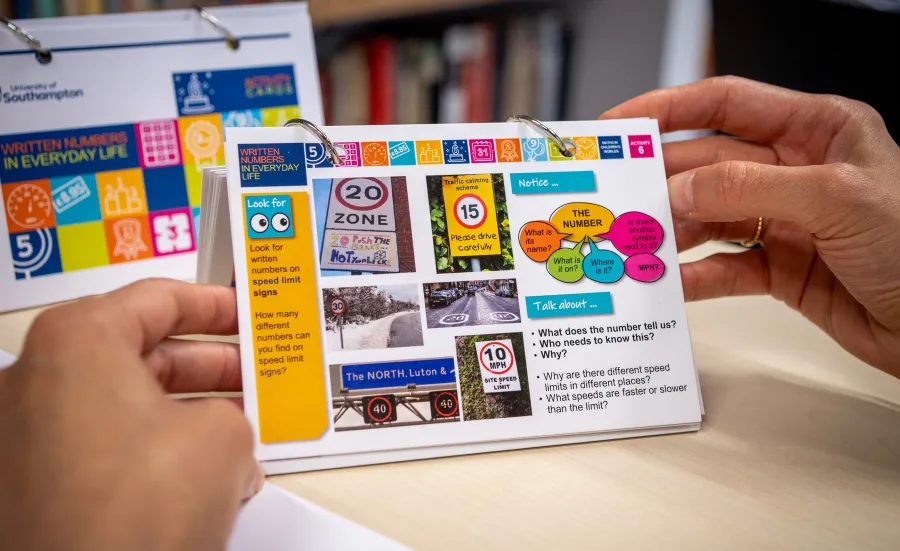Numbers are all around us, on various signs, displays, price tags and size labels. They communicate different meanings and have different social uses and purposes that help us organise our lives.
Family engagement critically influences children’s early knowledge and disposition towards mathematics and can have a long-lasting effect on their attainment. But research suggests that many parents and adults are reluctant to engage with mathematics.
A team of Southampton researchers, specialising in early mathematics learning, has developed the Numbers in Everyday Life resources that embed number spotting games within everyday family routines. They worked in close collaboration with national and international early years educational settings and primary schools.
Developing resources to embed learning about numbers in family life
The project is led by Dr Charis Voutsina, from Southampton Education School, and explores how families in diverse contexts can be supported to engage with children’s learning about numbers as part of their everyday experiences at home, and in different community and cultural settings.
The team has developed family-based resources that aim to foster positive family engagement with number-related ideas, early in children’s lives by:
- triggering young children’s curiosity and interest about numbers outside the classroom
- empowering families to talk about numbers
- enabling educators and families to make meaningful connections between children’s experiences with numbers in everyday situations and learning about numbers at preschool or school
The project is unique as it focuses on the social, everyday meaning of numbers that is knowledge that most people have, irrespective of how confident they feel about mathematics. It provides an accessible and inclusive approach to family engagement with maths learning.
The design and content of the activities is based on evidence produced from a previous study that was funded by the Leverhulme Trust and examined preschool children’s conceptions of the cultural rules and uses of written numerals in everyday environments.
The impact
The project was initially rolled out across Southampton, before being expanded nationally and internationally through a partnership with researchers and early years settings in Jamaica. So far, the resources have reached 700 families.
The resources are in two formats, a home learning booklet and a set of family activity postcards. They have been very well-received by education settings and parents.
The impact that talking about numbers to children can have, just when you're out and about doing your everyday living, is huge. I think parents have really realised that, and there's been lots of conversations from parents around that. Bringing the parents into this maths world has been really, really valuable.
Kathryn Nichols, Senior Leader at Houghton Community Nursery School, in Houghton-le-Spring
A parent at Corrie Primary and Nursery School, Tameside, said: “This project has been very beneficial to Emily and to us as parents. It has shown us different ways to get her engaged in learning without her feeling as if she is in a lesson. Emily now points out numbers wherever she sees them and asks what they are for. We’ve all really enjoyed doing these activities and will be carrying them forward.”
A parent at Mansbridge Primary School, in Southampton, added: “When my child notices numbers it helps me think more about how to explain their meaning and what to look out for. We will definitely carry on talking about numbers and number spotting!”






